时态总复习-初高中衔接课件(共22张PPT)
文档属性
| 名称 | 时态总复习-初高中衔接课件(共22张PPT) | 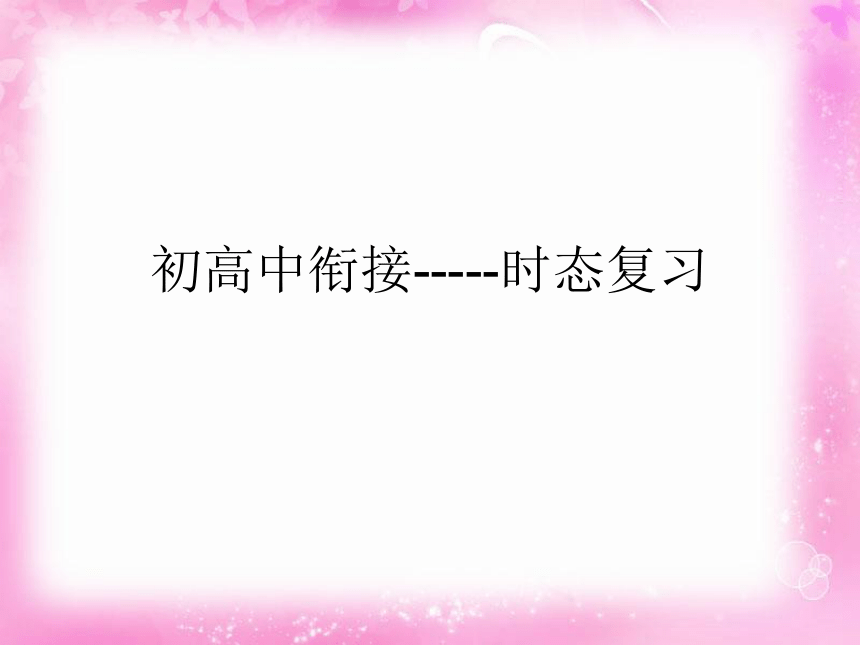 | |
| 格式 | pptx | ||
| 文件大小 | 286.6KB | ||
| 资源类型 | 教案 | ||
| 版本资源 | 人教版(2019) | ||
| 科目 | 英语 | ||
| 更新时间 | 2021-09-17 14:50:45 | ||
图片预览

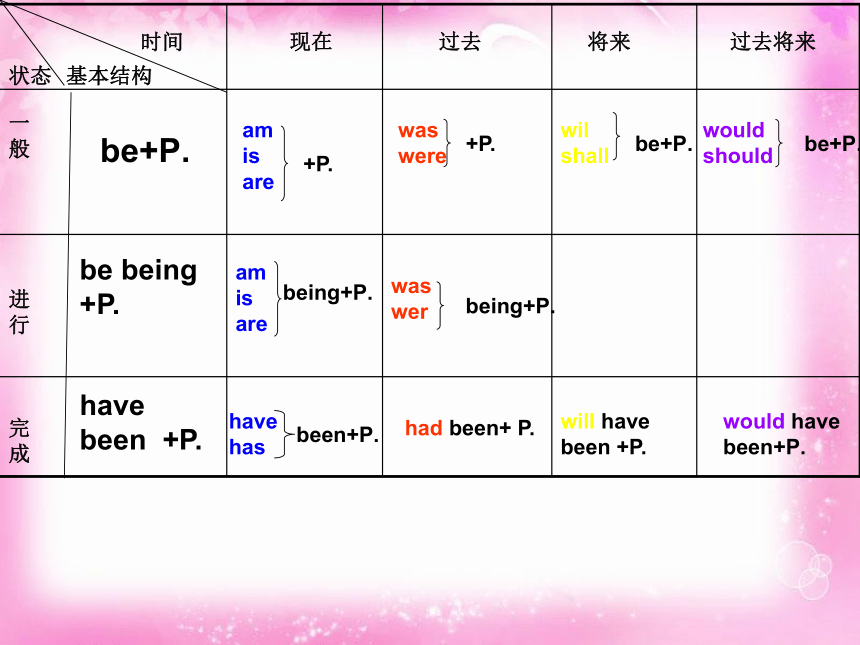
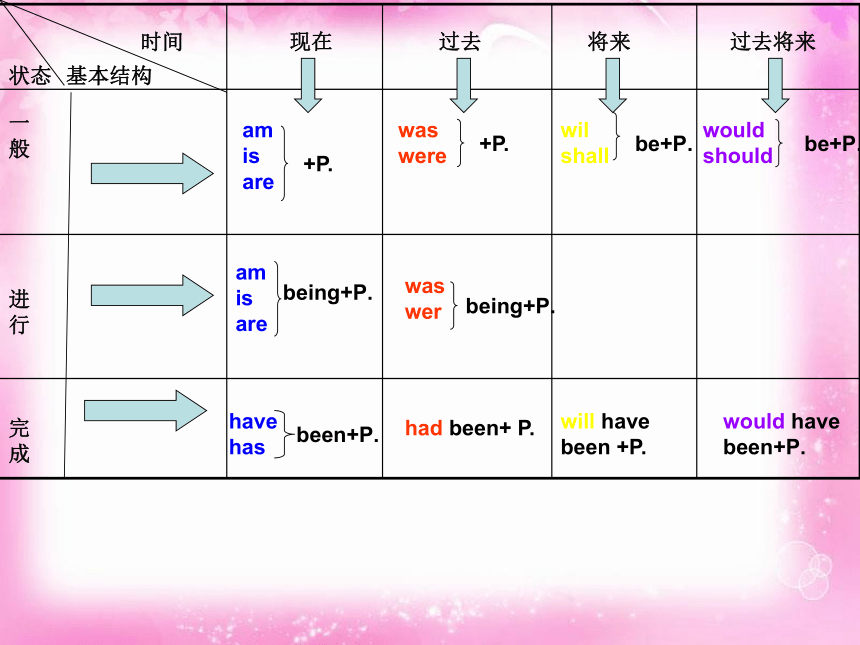
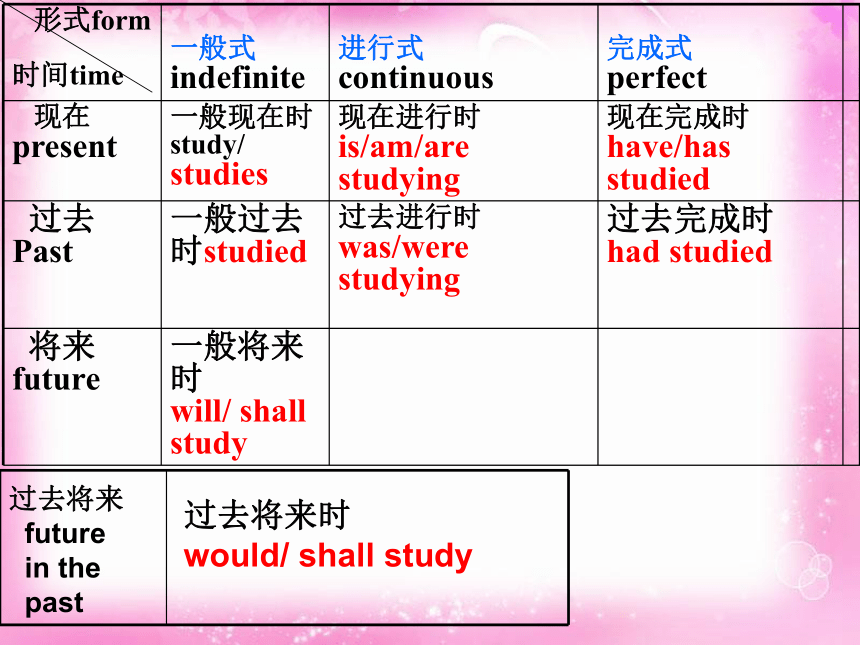
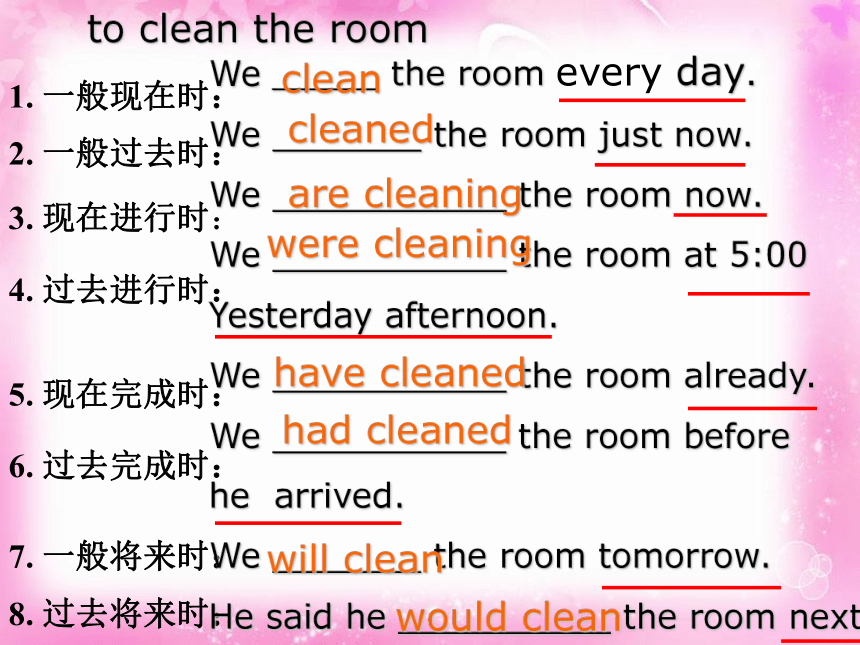
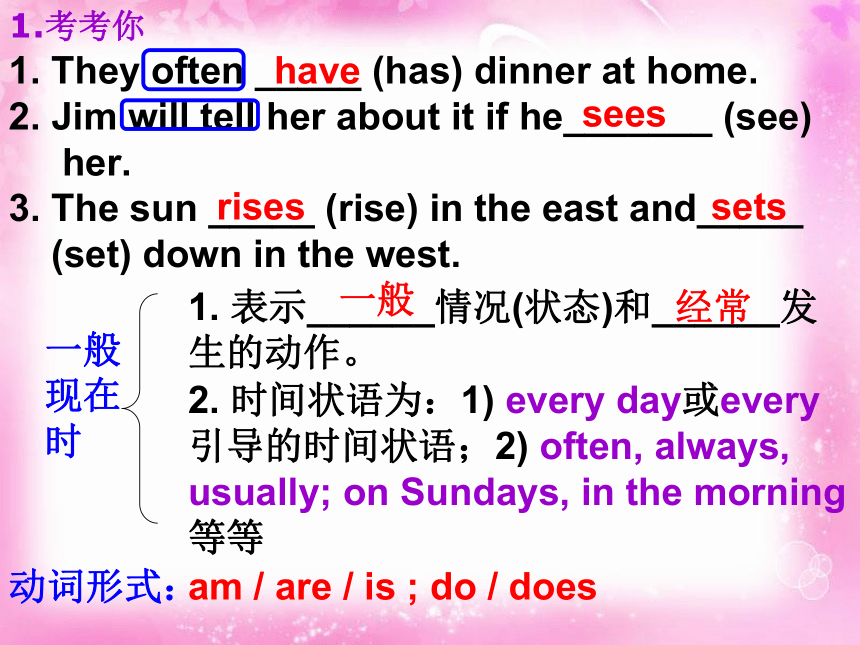
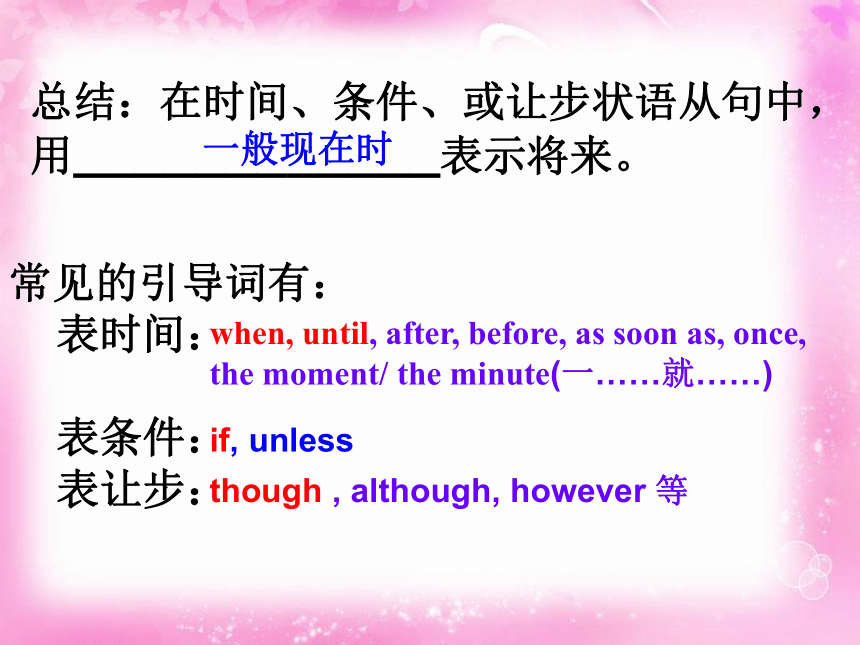
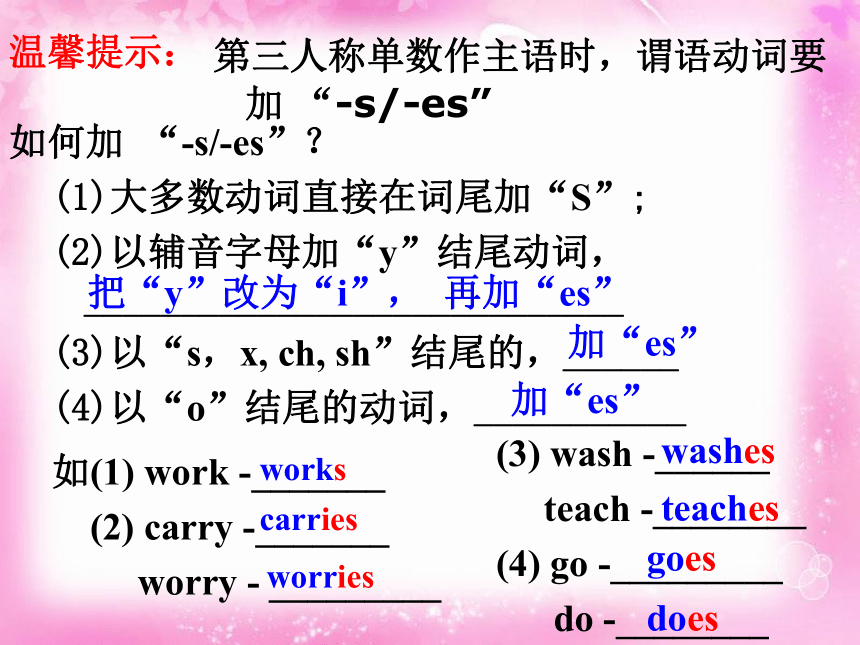
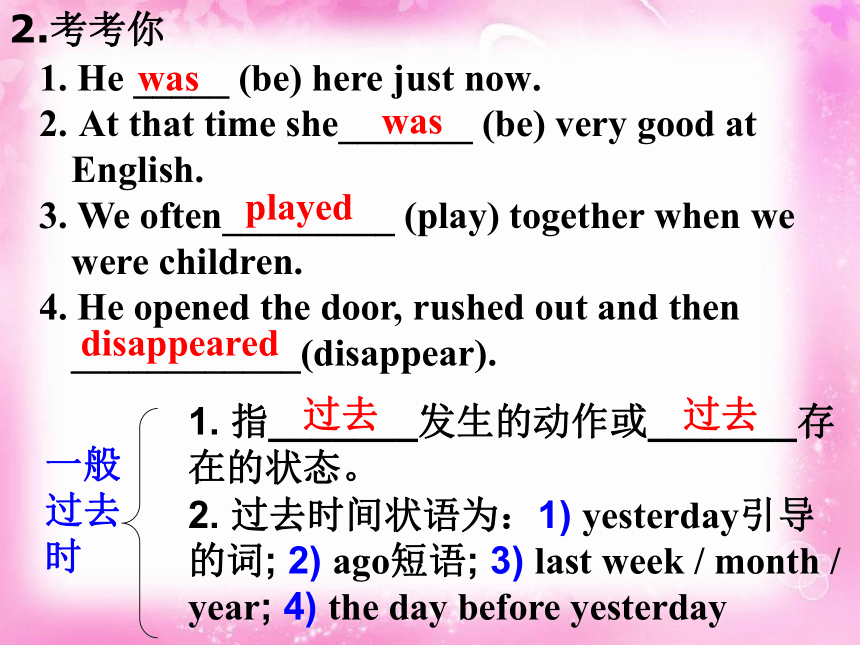
文档简介
(共22张PPT)
初高中衔接-----时态复习
状态
基本结构
时间
一
般
进行
完成
现在
过去
将来
过去将来
had
been+
P.
am
is
are
have
has
+P.
am
is
are
being+P.
been+P.
be
being
+P.
have
been
+P.
be+P.
was
wer
wil
shall
will
have
been
+P.
was
were
+P.
be+P.
being+P.
would
have
been+P.
would
should
be+P.
状态
基本结构
时间
一
般
进行
完成
现在
过去
将来
过去将来
have
has
was
were
wil
shall
would
should
was
wer
had
been+
P.
am
is
are
+P.
am
is
are
being+P.
been+P.
will
have
been
+P.
+P.
be+P.
being+P.
would
have
been+P.
be+P.
形式form
时间time
一般式
indefinite
进行式
continuous
完成式
perfect
现在
present
一般现在时study/
studies
现在进行时
is/am/are
studying
现在完成时
have/has
studied
过去
Past
一般过去时studied
过去进行时was/were
studying
过去完成时
had
studied
将来
future
一般将来时
will/
shall
study
过去将来
future
in
the
past
过去将来时
would/
shall
study
to
clean
the
room
1.
一般现在时:
2.
一般过去时:
3.
现在进行时:
4.
过去进行时:
5.
现在完成时:
6.
过去完成时:
7.
一般将来时:
8.
过去将来时:
We
_____
the
room
every
day.
We
_______
the
room
just
now.
We
___________
the
room
now.
We
___________
the
room
at
5:00
Yesterday
afternoon.
We
___________
the
room
already.
We
___________
the
room
before
he
arrived.
We
_______
the
room
tomorrow.
He
said
he
__________
the
room
next.
clean
cleaned
are
cleaning
were
cleaning
have
cleaned
had
cleaned
will
clean
would
clean
1.
They
often
_____
(has)
dinner
at
home.
Jim
will
tell
her
about
it
if
he_______
(see)
her.
3.
The
sun
_____
(rise)
in
the
east
and_____
(set)
down
in
the
west.
have
sees
rises
sets
1.考考你
一般现在时
1.
表示______情况(状态)和______发生的动作。
2.
时间状语为:1)
every
day或every引导的时间状语;2)
often,
always,
usually;
on
Sundays,
in
the
morning等等
一般
经常
动词形式:
am
/
are
/
is
;
do
/
does
总结:在时间、条件、或让步状语从句中,用____________表示将来。
一般现在时
常见的引导词有:
表时间:
表条件:
表让步:
when,
until,
after,
before,
as
soon
as,
once,
the
moment/
the
minute(一……就……)
though
,
although,
however
等
if,
unless
温馨提示:
第三人称单数作主语时,谓语动词要加
“-s/-es”
如何加
“-s/-es”?
(1)大多数动词直接在词尾加“S”;
(2)以辅音字母加“y”结尾动词,____________________________
(3)以“s,x,
ch,
sh”结尾的,______
(4)以“o”结尾的动词,___________
把“y”改为“i”,
再加“es”
加“es”
加“es”
如(1)
work
-_______
(2)
carry
-_______
worry
-
_________
(3)
wash
-______
teach
-________
(4)
go
-_________
do
-________
works
carries
worries
washes
teaches
goes
does
1.
He
_____
(be)
here
just
now.
At
that
time
she_______
(be)
very
good
at
English.
3.
We
often_________
(play)
together
when
we
were
children.
4.
He
opened
the
door,
rushed
out
and
then
____________(disappear).
2.考考你
was
was
played
disappeared
一般过去时
1.
指_______发生的动作或_______存在的状态。
2.
过去时间状语为:1)
yesterday引导的词;
2)
ago短语;
3)
last
week
/
month
/
year;
4)
the
day
before
yesterday
过去
过去
动词如何变过去式??
(1)大多数动词直接在词尾加______(注意:以不发音“e”结尾,加“d”);
(2)以辅音字母加“y”结尾动词,__________________
(3)重读闭音节的单词,双写_____________
(4)熟记不规则动词表
如(1)work
->_______
(2)carry
->_______
worry
->_________
(3)stop
->______
wrap->________
drop
->_________
worked
carried
worried
stopped
wrapped
dropped
“ed”
把“y”改为“i”,
再加“ed”
最后一个字母,再加“ed”
一起来回忆:
动词如何变成过去式?
一.
一
般现在时
1)
Class
begins
at
eight
every
morning.
He
looks
tired.
2)
The
sun
rises
in
the
east
and
sets
in
the
west.
3)
I
will
stay
at
home
if
it
rains
tomorrow.
现在习惯性或经常性的动作、存在的状态
常用的时间状语有:often,
sometimes,
usually,
always,
seldom,
every
day,
in
the
morning,
on
Sunday,
etc.
客观事实或普遍真理或格言
在含时间和条件状语从句的复合句中
主句用一般将来时,从句则用一般现在时表将来。(主将从现)
am/
is/are
do/does(单数第三人称)
注意:时间状语从句和条件状语从句中用一般时表示将来。
1.
I
will
wait
until
he
_________(
arrive).
2.
If
he_____________
(not
come)on
time,
we
won’t
know
what
to
know.
3.
I’ll
go
there
unless
it
_________
(rain).
4.
The
boy
wants
to
be
a
writer
when
he
______(grow)
up.
arrives
doesn’t
come
rains
grows
二.一般过去时
1)
如
He
traveled
in
Europe
last
year.
He
was
in
Beijing
some
years
ago.
When
I
was
at
college,
I
wrote
home
once
a
week.
He
went
to
town,
bought
some
books
and
visited
his
daughter.
过去时间里发生的的动作或存在的状态
常与表过去的时间状语连用,如a
few
minutes
ago,
yesterday,
last
Sunday,
etc以及由when引导的时间状语从句(或上下文语境有暗示)。
was/
were
/
did
三.一般将来时
(1)
When
shall
we
meet
tomorrow?
I’ll
ask
her
as
soon
as
she
comes.
Your
dress
will
be
ready
soon.
(2)
Mr.
Green
is
going
to
buy
a
new
car.
will/
shall
+
be/V
表示现在计划
决定
打算做某事。
表将来要发生的动作或状态,常与表将来到时间状语tomorrow,
next
year,
in
a
few
years,
next....
,from
now
on,
in
the
future,等连用;更多地用于带有条件从句的主句中(shall用于第一人称,will用于各种人称)
be
(is/
am/
are)
going
to
do
1.When
he
______
(come
),
we’ll
go
out
to
meet
him.
2.
The
earth
_______
(travel)around
the
sun
3.
He
______
(get
up)at
six
o'clock
every
day.
4..I
_________(tell
)her
when
she
comes
tomorrow.
5.
He
_______
(buy)the
computer
five
years
ago.
6.
The
three
of
us
_______
(travel
)Europe
for
about
a
month
last
summer.
7.
He______
(work)
in
a
factory
in
1986.
8.
When
she
was
in
the
city,
she
often
______(go)
to
the
park
in
the
evening.
9.
He
_______(speak)
French
well.
He_______
(study)
French
in
Beijing
university
4
years
ago.
10.
She
________________
(graduate
from
)Beijing
university
next
year
.
11.
I
__________
(see
)you
next
week
comes
travels
gets
up
will
tell
bought
travelled
worked
went
speaks
studied
will
graduate
from
shall
see
动词变化加
-ing
1)
clean
->
cleaning
2)
以不发音“e”结尾的,去掉字母“e”,再加-ing
make
->
making
3)
重读闭音节的单词,双写最后一个字母,再加-ing
swim
->
swimming
进行式
???
please
write
the
–ing
form
of
the
following
verbs:
1)give____
2)use____
3)move____
4)skate____
5)draw____
6)tell____
7)ring____
8)wear____
9)get____
10)put____
11)hit____
12)stop____
13)lie____
14)die____
15)
carry____
16)
begin____
17)see____
giving
using
moving
skating
drawing
telling
ringing
wearing
getting
putting
hitting
stopping
lying
dying
carrying
beginning
seeing
过去将来时
1)He
said
his
mother
would
buy
a
bike
for
him
2)My
brother
told
me
he
wouldn’t
believe
Jack
any
more.
3)Would
it
be
all
right
if
he
knew
his
illness?
现在完成时
两种基本用法:
1、过去动作对现在的影响,与ever,never,just,so
far,in
these
days,already,
yet连用;
2、从过去一直延续到现在的动作
注意:
have
been
to:去过某地,当事人在场
have
gone
to:去了某地,当事人不在场
现在完成时
1)How
many
words
have
you
learnt
today?
2)He
hasn't
got
up
yet.
3)I
have
been
to
England.
4)Tom
isn’t
here.
He
has
gone
to
Hangzhou.
过去完成时
过去的过去:
1、在过去某个动作之前就已经完成的动作:过去完成式,过去以前发生的事情
。
。。。someone
had
told...
The
train
had
left
before
he
got
to
the
railway
station.
2、过去时间的过去:by+过去时间
We
had
finished
Grade
7
by
the
end
of
this
June.
How
many
English
words
had
you
learnt
by
the
end
of
last
term?
someone
had
told...
过去完成时
1)He
said
he
hadn't
collected
300
stamps.
2)Had
you
learnt
280
new
words
by
the
end
of
last
month
?
3)When
I
rushed
to
the
cinema,
the
film
had
begun.
初高中衔接-----时态复习
状态
基本结构
时间
一
般
进行
完成
现在
过去
将来
过去将来
had
been+
P.
am
is
are
have
has
+P.
am
is
are
being+P.
been+P.
be
being
+P.
have
been
+P.
be+P.
was
wer
wil
shall
will
have
been
+P.
was
were
+P.
be+P.
being+P.
would
have
been+P.
would
should
be+P.
状态
基本结构
时间
一
般
进行
完成
现在
过去
将来
过去将来
have
has
was
were
wil
shall
would
should
was
wer
had
been+
P.
am
is
are
+P.
am
is
are
being+P.
been+P.
will
have
been
+P.
+P.
be+P.
being+P.
would
have
been+P.
be+P.
形式form
时间time
一般式
indefinite
进行式
continuous
完成式
perfect
现在
present
一般现在时study/
studies
现在进行时
is/am/are
studying
现在完成时
have/has
studied
过去
Past
一般过去时studied
过去进行时was/were
studying
过去完成时
had
studied
将来
future
一般将来时
will/
shall
study
过去将来
future
in
the
past
过去将来时
would/
shall
study
to
clean
the
room
1.
一般现在时:
2.
一般过去时:
3.
现在进行时:
4.
过去进行时:
5.
现在完成时:
6.
过去完成时:
7.
一般将来时:
8.
过去将来时:
We
_____
the
room
every
day.
We
_______
the
room
just
now.
We
___________
the
room
now.
We
___________
the
room
at
5:00
Yesterday
afternoon.
We
___________
the
room
already.
We
___________
the
room
before
he
arrived.
We
_______
the
room
tomorrow.
He
said
he
__________
the
room
next.
clean
cleaned
are
cleaning
were
cleaning
have
cleaned
had
cleaned
will
clean
would
clean
1.
They
often
_____
(has)
dinner
at
home.
Jim
will
tell
her
about
it
if
he_______
(see)
her.
3.
The
sun
_____
(rise)
in
the
east
and_____
(set)
down
in
the
west.
have
sees
rises
sets
1.考考你
一般现在时
1.
表示______情况(状态)和______发生的动作。
2.
时间状语为:1)
every
day或every引导的时间状语;2)
often,
always,
usually;
on
Sundays,
in
the
morning等等
一般
经常
动词形式:
am
/
are
/
is
;
do
/
does
总结:在时间、条件、或让步状语从句中,用____________表示将来。
一般现在时
常见的引导词有:
表时间:
表条件:
表让步:
when,
until,
after,
before,
as
soon
as,
once,
the
moment/
the
minute(一……就……)
though
,
although,
however
等
if,
unless
温馨提示:
第三人称单数作主语时,谓语动词要加
“-s/-es”
如何加
“-s/-es”?
(1)大多数动词直接在词尾加“S”;
(2)以辅音字母加“y”结尾动词,____________________________
(3)以“s,x,
ch,
sh”结尾的,______
(4)以“o”结尾的动词,___________
把“y”改为“i”,
再加“es”
加“es”
加“es”
如(1)
work
-_______
(2)
carry
-_______
worry
-
_________
(3)
wash
-______
teach
-________
(4)
go
-_________
do
-________
works
carries
worries
washes
teaches
goes
does
1.
He
_____
(be)
here
just
now.
At
that
time
she_______
(be)
very
good
at
English.
3.
We
often_________
(play)
together
when
we
were
children.
4.
He
opened
the
door,
rushed
out
and
then
____________(disappear).
2.考考你
was
was
played
disappeared
一般过去时
1.
指_______发生的动作或_______存在的状态。
2.
过去时间状语为:1)
yesterday引导的词;
2)
ago短语;
3)
last
week
/
month
/
year;
4)
the
day
before
yesterday
过去
过去
动词如何变过去式??
(1)大多数动词直接在词尾加______(注意:以不发音“e”结尾,加“d”);
(2)以辅音字母加“y”结尾动词,__________________
(3)重读闭音节的单词,双写_____________
(4)熟记不规则动词表
如(1)work
->_______
(2)carry
->_______
worry
->_________
(3)stop
->______
wrap->________
drop
->_________
worked
carried
worried
stopped
wrapped
dropped
“ed”
把“y”改为“i”,
再加“ed”
最后一个字母,再加“ed”
一起来回忆:
动词如何变成过去式?
一.
一
般现在时
1)
Class
begins
at
eight
every
morning.
He
looks
tired.
2)
The
sun
rises
in
the
east
and
sets
in
the
west.
3)
I
will
stay
at
home
if
it
rains
tomorrow.
现在习惯性或经常性的动作、存在的状态
常用的时间状语有:often,
sometimes,
usually,
always,
seldom,
every
day,
in
the
morning,
on
Sunday,
etc.
客观事实或普遍真理或格言
在含时间和条件状语从句的复合句中
主句用一般将来时,从句则用一般现在时表将来。(主将从现)
am/
is/are
do/does(单数第三人称)
注意:时间状语从句和条件状语从句中用一般时表示将来。
1.
I
will
wait
until
he
_________(
arrive).
2.
If
he_____________
(not
come)on
time,
we
won’t
know
what
to
know.
3.
I’ll
go
there
unless
it
_________
(rain).
4.
The
boy
wants
to
be
a
writer
when
he
______(grow)
up.
arrives
doesn’t
come
rains
grows
二.一般过去时
1)
如
He
traveled
in
Europe
last
year.
He
was
in
Beijing
some
years
ago.
When
I
was
at
college,
I
wrote
home
once
a
week.
He
went
to
town,
bought
some
books
and
visited
his
daughter.
过去时间里发生的的动作或存在的状态
常与表过去的时间状语连用,如a
few
minutes
ago,
yesterday,
last
Sunday,
etc以及由when引导的时间状语从句(或上下文语境有暗示)。
was/
were
/
did
三.一般将来时
(1)
When
shall
we
meet
tomorrow?
I’ll
ask
her
as
soon
as
she
comes.
Your
dress
will
be
ready
soon.
(2)
Mr.
Green
is
going
to
buy
a
new
car.
will/
shall
+
be/V
表示现在计划
决定
打算做某事。
表将来要发生的动作或状态,常与表将来到时间状语tomorrow,
next
year,
in
a
few
years,
next....
,from
now
on,
in
the
future,等连用;更多地用于带有条件从句的主句中(shall用于第一人称,will用于各种人称)
be
(is/
am/
are)
going
to
do
1.When
he
______
(come
),
we’ll
go
out
to
meet
him.
2.
The
earth
_______
(travel)around
the
sun
3.
He
______
(get
up)at
six
o'clock
every
day.
4..I
_________(tell
)her
when
she
comes
tomorrow.
5.
He
_______
(buy)the
computer
five
years
ago.
6.
The
three
of
us
_______
(travel
)Europe
for
about
a
month
last
summer.
7.
He______
(work)
in
a
factory
in
1986.
8.
When
she
was
in
the
city,
she
often
______(go)
to
the
park
in
the
evening.
9.
He
_______(speak)
French
well.
He_______
(study)
French
in
Beijing
university
4
years
ago.
10.
She
________________
(graduate
from
)Beijing
university
next
year
.
11.
I
__________
(see
)you
next
week
comes
travels
gets
up
will
tell
bought
travelled
worked
went
speaks
studied
will
graduate
from
shall
see
动词变化加
-ing
1)
clean
->
cleaning
2)
以不发音“e”结尾的,去掉字母“e”,再加-ing
make
->
making
3)
重读闭音节的单词,双写最后一个字母,再加-ing
swim
->
swimming
进行式
???
please
write
the
–ing
form
of
the
following
verbs:
1)give____
2)use____
3)move____
4)skate____
5)draw____
6)tell____
7)ring____
8)wear____
9)get____
10)put____
11)hit____
12)stop____
13)lie____
14)die____
15)
carry____
16)
begin____
17)see____
giving
using
moving
skating
drawing
telling
ringing
wearing
getting
putting
hitting
stopping
lying
dying
carrying
beginning
seeing
过去将来时
1)He
said
his
mother
would
buy
a
bike
for
him
2)My
brother
told
me
he
wouldn’t
believe
Jack
any
more.
3)Would
it
be
all
right
if
he
knew
his
illness?
现在完成时
两种基本用法:
1、过去动作对现在的影响,与ever,never,just,so
far,in
these
days,already,
yet连用;
2、从过去一直延续到现在的动作
注意:
have
been
to:去过某地,当事人在场
have
gone
to:去了某地,当事人不在场
现在完成时
1)How
many
words
have
you
learnt
today?
2)He
hasn't
got
up
yet.
3)I
have
been
to
England.
4)Tom
isn’t
here.
He
has
gone
to
Hangzhou.
过去完成时
过去的过去:
1、在过去某个动作之前就已经完成的动作:过去完成式,过去以前发生的事情
。
。。。someone
had
told...
The
train
had
left
before
he
got
to
the
railway
station.
2、过去时间的过去:by+过去时间
We
had
finished
Grade
7
by
the
end
of
this
June.
How
many
English
words
had
you
learnt
by
the
end
of
last
term?
someone
had
told...
过去完成时
1)He
said
he
hadn't
collected
300
stamps.
2)Had
you
learnt
280
new
words
by
the
end
of
last
month
?
3)When
I
rushed
to
the
cinema,
the
film
had
begun.
